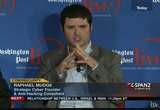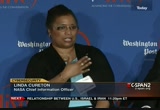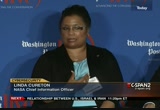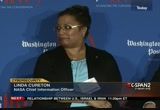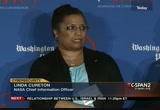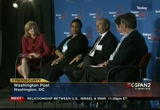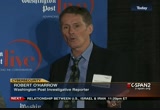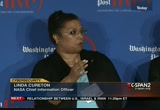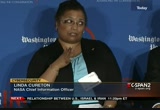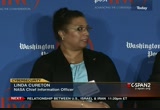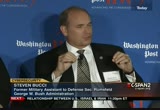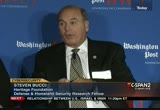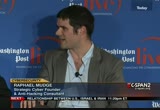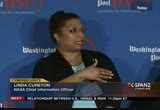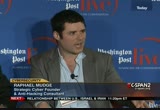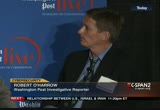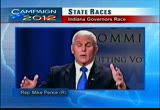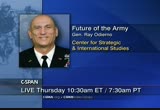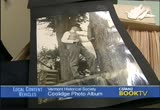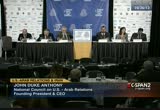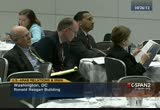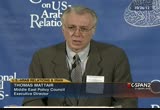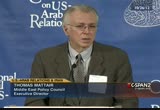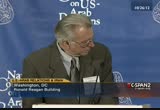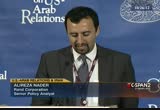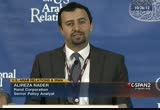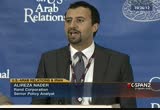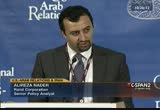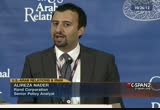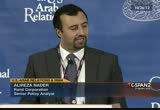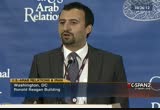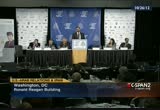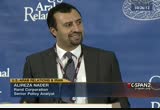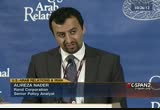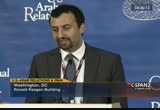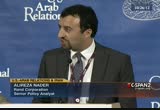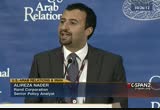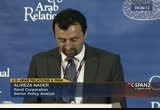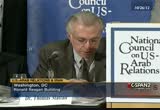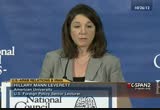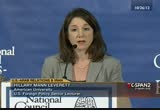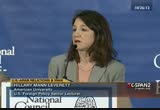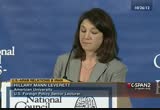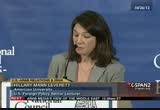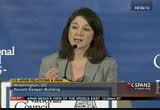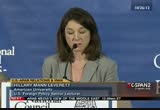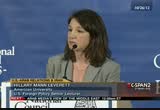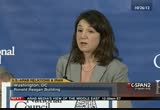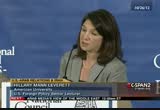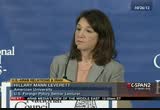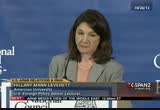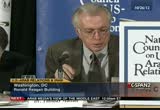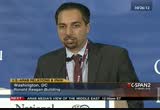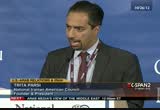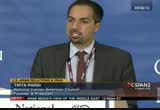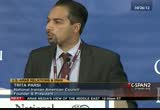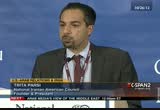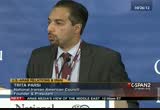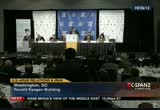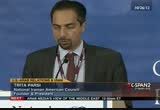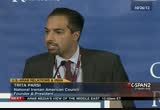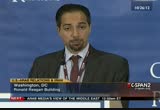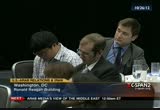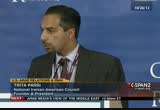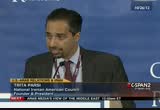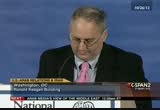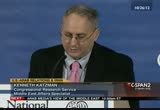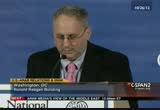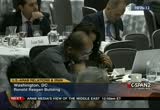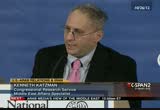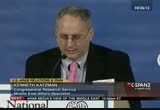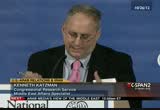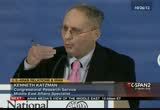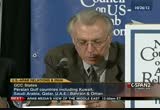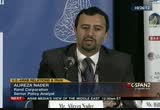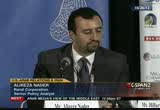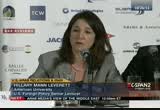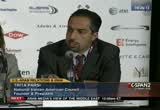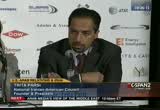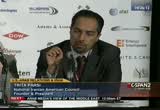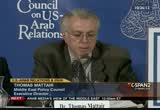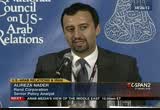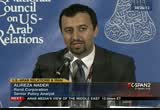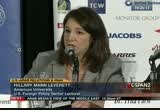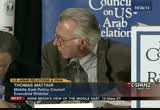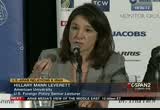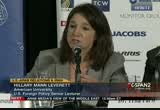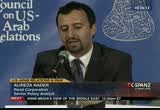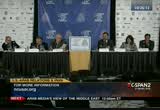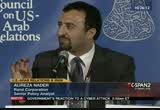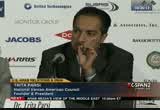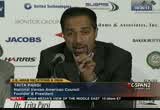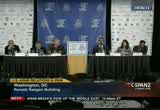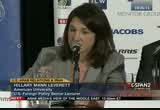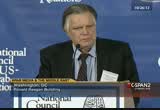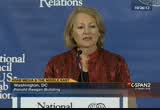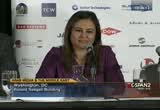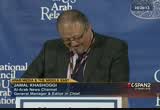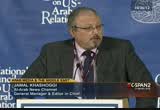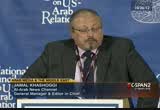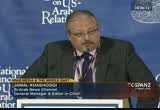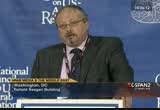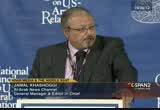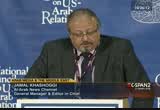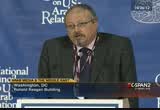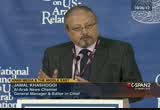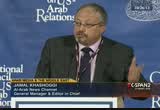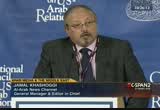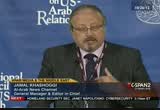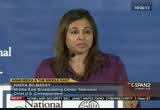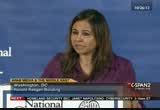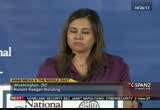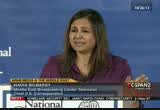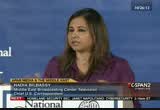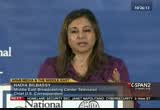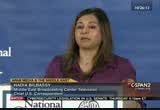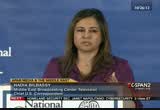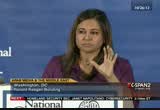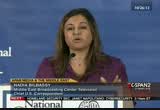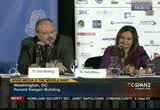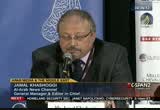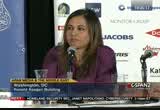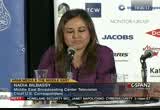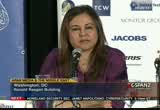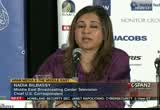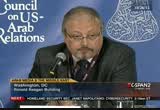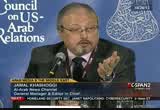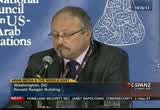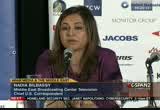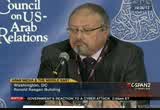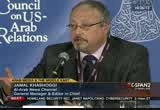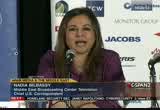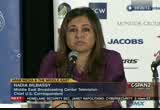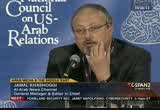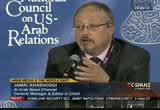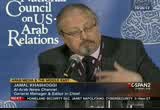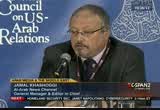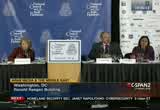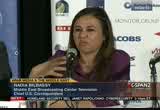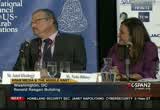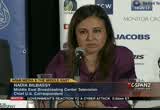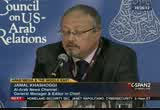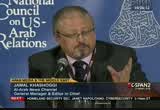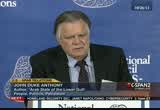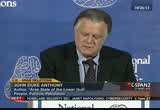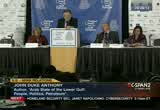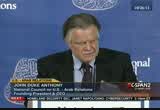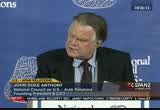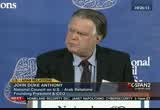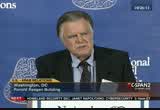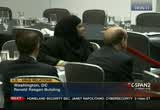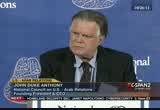tv Capital News Today CSPAN October 31, 2012 11:00pm-2:00am EDT
11:00 pm
i am not confident that there is a measure that the government can take to make everything more secure. what i do believe would be possible is there could be a better way to incentivize. because right now when we heard dimitri with the oil company ceo, he has said, i have these regulatory issues. how long can i try to contain this before i bring others and? >> maybe we can keep this under the rug. there is a lot happening there. have you incentivize them to share information. >> i have to jump in. okay. i'm just a girl trying to
11:01 pm
protect a network share. the thing is i don't believe that this is the right model. i think crime is a better model. if you look at crime now, people say, well, you pour more money into it, then are we going to reduce crime. if we have more policemen, is that going to reduce crime? if you have laws, regulations won't stop it, laws won't stop it, it is just vigilant. vigilance about citizens protection and the way that they need to comment having law enforcement in the right places in order to best leverage a limited number of resources. and i think we really need to get beyond the conversation
11:02 pm
cannot wait for the next 9/11 to come together and get something viable and practical that we can do. >> is there anything other than this that you suggest, samantha? >> yes, i'm not really going to talk about it, they will tell you about whether or not it works. but i think that every agency has seen tremendous assets going. and we find out about it. what we find out about it from the outside. we find out about it a lot of ways. i think that our rule is to make sure that the data and the damages assessed as much as we can. we make sure that we protect everything that we can. nasa has said that we don't want to give away certain things. everyone who says we don't want this, they just don't know. but agencies, just like we
11:03 pm
talked about, we are not going to go and just give the roadmap to our database here. we are going to be very reticent about what is going on. >> every federal agency has. every course corporation, i would say, has. you keep upping the ante. >> i was wondering to what extent we have a contracting process to require that contractors meet security standards. whatever different standards you can mandate. are you using that risk shipping
11:04 pm
process to bring your vendors up to standards, and i would be interested in the tape on using the contracting process rather than the regulatory process. >> okay. we already doing that. we have standard language in every language, that it will follow the nasa security policies and procedures. we have created that and put that together, and we also have the regulations that massive supplements to that that speaks to that. we have also addressed it that way. that is the minimum of what you have to do. what we need to do is raise the bar. once that language is in there, maybe five years old or 10 years old or even five minutes old, five minutes later, the bar is raised and it is continually vigilant. and the challenge is how you can
11:05 pm
tinley pulled accountability to the contractor for things that are always changing. there is no easy answer to that. you just keep plugging along. >> and you say that is a better solution than doing it as a blanket regulation, even across specific sectors? >> i'm saying that that is a minimum. >> i like the idea of it. the idea of the building floating level of security. it is not easy to do. it is the dynamic nature of it that makes this very difficult and makes it that much more important that we have a system that allows for and accommodates that dynamic nature. >> there is something happening that i think is very fascinating. it goes to something that you said earlier. your comments, all three of you, have underscored something that
11:06 pm
most still don't really grasp, which is how pervasive the threats are and how there really is no stopping. that is used for most people, how profound the threats are for stealing the information unsettling scenarios on the infrastructure. i just want to raise that point. the other issue that i want to bring up is you are very good with important ideas of somehow educating people to that. and spreading the word in a way that the sky is not falling, but the clouds are out there and there is a lot going on. and people have to learn that so that they start to behave differently and they start becoming amenable to the series demand for better personal hygiene on the network. >> so today's the last day of
11:07 pm
cybersecurity awareness month. where it has been a challenge. one of the things, i think is that we need higher-level awareness there is a question about when you look at what abilities, do you look at just the work environment where do you look at the home environment. a lot of habits that you have a development for home, you want people to practice safe computing wherever they are. whether or not it is their device from your device, or whatever kind of device. so i think that to sympathize with the public to the challenges and in a way that we
11:08 pm
did keep america beautiful, keep america safe, i think that we really need to do that. the second point -- i have three of them. the second point is that the sky is falling ocean is just hurting us. because people say yeah, right. but i think that we need to not communicate the sky is falling in the sky is just not going to fall. a lot of people compare now to what we did and there was a certain amount of sky is falling with y2k. the sky didn't fall. nothing fell out the sky. yet we felt we spent a lot of time and resources. last one i want to make is that it is difficult to share information when we have two political fortunes to classify. it is something that i need to know or communicate. i can't communicate what you
11:09 pm
guys right now. but yet, the key aspects that are important that you might need it now but i can tell you -- >> what you mean? >> you try to communicate the best way you can. and so the set have something to tell you, it's really important, just trust me -- that only goes so far. >> so in this scenario -- >> yeah, but you can't read and 44,000 people. >> there is a raging debate that has been going on for a couple of years inside the pentagon. it is fascinating stuff. there is a school that wants everything to be classified and kept under blankets because the fear of the secrets will come out and make us more miserable. there is another school that is arguing the opposite. but we opened as much information as possible for the
11:10 pm
reasons that you mentioned and also, to allow ideas to bubble up so that it is not solutions, but ways of minimizing the damage. a complete implemented. i do think we are in a very interesting time on that. >> the vast majority of things, there is no way that we can figure out the source of the methods it came from. there are some things, and printed there is a category that needs to be protected because there are people at risk. but those are all a lot smaller than the stuff we have thrown the blanket over. particularly with cyber, we have to get away from them, we have to change that culture, we need to get that conversation going with the private sector and our own employees, with our families. or we are never going to get to the point where the national level of awareness is right
11:11 pm
where it needs to be. the people that are really involved in defending the networks, the heavy stuff but that awareness can use to do their jobs. right now they are busy cleaning up people like me who need to be dealing with the threats, the real big threats, but they can't get those all the time because they can't remember their passwords or someone does something stupid at home. because he trying to get his work done by bring something home, a thumb drive or something, and then bring something contaminated back. we have to build that awareness. the culture of classification we have today is not helping that. we need to move in the other direction. >> to talk about some of the other things that people do that make life easier? like the example of 98 windows.
11:12 pm
>> yes, do not click on links that you don't know who it's from. if you see something like a file -- this is a silly one -- but if you see a file don't click on that. my favorite one is -- and this is targeting a couple things, executives were being sent this file because please download that at a secure pdf. most people don't know that it is an executable screensaver. by opening that up, they are giving the hacker access to their computer. things that you see in networks, common ones, they set up one perfect image. the problem is if you don't take the local administrator password and change it come once i get into the system, isolate my i hate the way my privileges and i'm able to get a hold of these
11:13 pm
passwords. >> so we do put prevent that from happening? >> make sure these local and ministry of passwords and these different workstations are sent to something different. >> anytime you rely on a person to do something and that is by your defense, we have to watch out for people who will inevitably make that mistake. you have to have measures in place go back and say, okay, we have to have that kind of auditing thing. >> yes, you have to assume that somebody is going to hit you eventually. it really helps to invest in understanding the tools that we practice using, what those tools look like and put in place pieces that protect them. i just got back from class on how to hack and i took my students through the toolkit,
11:14 pm
here's everything we did, here's here is what we look like coming here are things and tools that i have. so taking kind of a counter approach to understanding what is being thrown at me, what does it look like and where is the weakness, that is a important thing to. >> we need to make network of vendors of more awareness of what is out there. even the offense of toolkit,. >> one of the things that amplifies leaders in the world, that is hacking networks, let's say, just for example, nasa.
11:15 pm
hiring a guy like raphael mudge to go in and under a nondisclosure agreement from attacking it like crazy. and finding the vulnerabilities. and someone is using tools available to anybody, including you. and that is becoming one of the most important forms of security now in the world. and so it is becoming a hacker versus hacker kind of environment. and that offense of security is becoming a key part of its. >> we are going to have to leave it there. i am grateful for the brainpower that we had here this morning. on this big and growing issue. we are going to be hosting the video highlights in a few hours, and tomorrow. we will leave them up there for either the "washington post" live.com on november 13 and we will have a selection where we share some of the highlights and
11:16 pm
prints about today. a huge thank you to all of our listeners. we continue the conversation and we thank you. cybersecurity 2012. a huge thank you to the audience at the "washington post." [applause] >> we have made incredible progress in the last several years. we have balanced budgets during all those years and we have become the fiscal entity of the country and now we have the largest budget surplus that we have ever had in our history. making it possible for us to strengthen our budget reserves, and i believe we can cut taxes. john, you just said we pay for things in indiana. okay, but when you were speaker speaker of the house, for five of the six years, indiana ran deficits. when mitch daniels caiman is a couple of years later on budgets that you helped to write,
11:17 pm
indiana was a 700 million-dollar state in debt, and had a deficit of $820 million. facts are stubborn things. i would just like to know for my colleagues how we are going to make sure we can preserve the fiscal integrity of the state of indiana. >> congressman, if you would've spent the last 12 years in indiana rather than in congress come up you would know that our balanced budget has to be done according to the constitution. i have balanced and produced bipartisan budgets. oddly, you talk about fort wayne's own day long in our lieutenant governor. i find it almost laughable that a united states congressman would lecture anyone about fiscal responsibility. you heard it not once, not twice, but five times, congressman. you voted and the results increased the deficit by $200 billion. >> find key house and senate in
11:18 pm
government races from across the country. find it at c-span.org/2012. >> we have a debate in rhode island's first house district. we will be live on c-span tomorrow night at 730 eastern from rhode island college. we will also be live on friday with the senate debate in the state of maine. six canids are running for the state of maine. the candidates include republican charlie summers and cynthia gild and angus king. our coverage is on c-span2 on friday at 7:00 p.m. eastern. >> through election day, what are coverage.
11:19 pm
11:20 pm
and president obama's campaign rally at the university of colorado, boulder. that is on c-span. [cheers] [applause] >> all right, let's get what documents the coolidge family during the white house years. and also before. >> part of the coolidge family papers. we have one box of photographs. then we have several boxes of other documents. photographs are heavy. the album should be in the back here. here it is. unfortunately, it is on lack civics paper. there's not much we can do about that because we don't want to change the artifact nature of
11:21 pm
the album itself. starting to crack, some of these pages are separating. this is a photograph of calvin coolidge the day before he became president. he was in plymouth, vermont, visiting his father, doing some chores, this was a press photograph. so he did have the press along with them. you can see that they took one photograph your. he had a suit jacket on. then there was another one of him without the suit jacket on. >> more from the vermont historical society this weekend apple tv, american history tv, and he spent local content vehicles. looking at the scenes of that history and literary life of montpelier, vermont, on booktv on c-span2. on american history tv on c-span3 as well.
11:22 pm
>> the national council on u.s. air relations. this 90 minute panel focuses on iran's nuclear program and the relationship between iran, the u.s., and israel. >> [inaudible] >> i would like to introduce doctor thomas mattair. he is a long-term professional writer and researcher in this field. he is also the executive director of the middle east policy council. the middle east policy council, as you may know, puts out the foremost periodical, if not the most periodical pertaining to the united states in the larger middle east and the islamic world as well. he spent some time there were years at the united arab emirates is a research at the emirates under four research and wrote a voluminous study of the
11:23 pm
issue of the three islands that are occupied by iran. and they became occupied on december 1, 1971. one of the three islands that the iranians occupied was smaller than the ship or naval vessel that occupied it. it has been a controversial issue ever since. it was part of the united arab emirates policy. doctor thomas mattair. >> thank you very much, john. i look forward to doing this. i appreciate the invitation. i especially look forward to it because i don't have to make a formal mark. i think this is a very well-chosen topic in a very well-chosen panel. because we are about to have an
11:24 pm
election for the presidency. whoever becomes president will have a very important decision to make. we should evaluate how successful we have been and what shortcomings need to be corrected. the reason the panel is well-chosen is because you're going to hear certain point of view on this topic. they obviously involve an examination of whether our diplomacy stands for objectives or thesymptoms have, and if they have, will they stand and be valuable in terms of iran. in the larger sense, the intervention in iraq. what impact did that have on iran for political solutions? the current policy that we have in syria, where we seem to be
11:25 pm
attempting to limit the regional influence on the air world, are we doing the right thing when i'm not -- are we doing too much. i cannot end without mentioning the palestinian question. more often i hear the argument that the argument is dead and that is a shame. because if we are going to negotiate with iran, it might be intelligent to do more than just talk about the nuclear issue. it might be better to talk about the full range of issues that are between us. at one point in time, iran indicated that willingness to talk about this and interest in doing their best. i think it makes in that region on all of these of concern
11:26 pm
concerns. we have a number of studies that are looking at the costs and benefits. the costs are very significant. i would like to mention one study that i think is something that hasn't been done in other studies. that is a study by trita parsi that details the human casualties in war from the toxic chemical fumes and the radioactivity. on both sides of the gulf. that is something you don't hear much about. so without further ado, i will introduce the panel. and i think we are going to have alireza nader speakers. then i will introduce each one
11:27 pm
as they are ready to speak. he's he is a senior policy analyst at the rand corporation. he is an author and also has written about israel and iran, and about succession and before coming to the corporation, he is actually a graduate of the loan program. >> are we ready? >> okay. >> good afternoon, i appreciate the opportunity to speak on a very important topic. i am going to talk about the effect of the arab spring on the islamic republic and its power on the region. and also, talk about a couple of sanctions and the effectiveness of u.s. policy toward iran.
11:28 pm
sanctions have hit upon a very terrible time for the islamic republic, at a time when the regional importance is in decline. and if you remember a few years ago, ron was really a defender in the region. some spoke of it as the region superpower. the iranian regime said that they were a key portion in the region. this was due to the invasion of iraq and iran's empowerment. after saddam hussein, and those parties taiko tied to iran, wonky debate is
11:29 pm
how powerful iran is. they are helpful. the islamic republic played a key role as part of the government, and it is a very powerful regional situation, especially in western afghanistan. in 2006, a relatively short war existed that had very important implications. hezbollah managed to stand up to is really military and a lot of errors in the region perceived hezbollah is having won the war. of course, it wasn't necessarily a technical military wing. but in some ways it was a psychological or political one. not a lot of arab armies have managed perform as well against israel. and of course, iran's ally took
11:30 pm
11:31 pm
because they thought iranians going into the street and challenging an authoritarian government. arabs should be dynamic and energetically the raining for 2009. of course the regime in tehran still stands today for a variety of reasons. one of time to get in to. but that was an indication in 2009 that the islamic republic was in trouble and this behavior demonstrated that it? legitimacy in iran and across the region. so the 2009 demonstrations really damaged the islamic republic's credential by the force of resistance and supported the downtrodden region. the arab spring has made things a lot worse for the islamic republic, namely due to tehran support for the bishara al-assad regime is area. iran has welcomed other uprisings in the region come at you in asia, because they saw
11:32 pm
uprisings as really hurting u.s. power influences in the regions, specifically the leadership of the islamic republic has been waiting for hosni mubarak to be overthrown for decades. he was one of their prime enemies in the region, competitor and influence in the region. the iranian leadership or trade the uprising as a victory. ayatollah khomeini, the leader of iran has claimed the arabs were inspired by the own islamic revolution in 1979. interestingly, the head of green movement, the saudi who is under house arrest claimed that the arabs weren't inspired by iran's revolution in 1979, but by the 2009 protests. regardless, the regime's actions
11:33 pm
in area have done a tremendous damage because it is viewed as being on the wrong side of history. not just by arabs necessarily, but iranians as well. as you know, the regime in syria has killed tens of thousands of people and iran has affect ably abetted this hearing machines crackdown or ill-treatment of insurgency. and it's not that the iranian leadership doesn't view iran's policy uniformly. there have been figures within the political elite that have questioned iran's approach. they realized that this bashar al-assad falls, iran will lose all, if not most of its influence in serious iran's gateway of influence in the arab world. so the stakes are high and iran and flexibility on the issue has been open to debate, but it can come the deer ran supreme leader
11:34 pm
ayatollah harmony has reported this year is a front line in the fight against the united states and were not going to back down because if we back down, will be next. so we can't expect a lot of flexibility in iran's possibility. we expect especially the revolutionary guard to support bashar al-assad as much as they can. in addition, despite the islamic republic's claim that the spring is beneficial, we see that in egypt, this is not necessarily the case. the muslim brotherhood in egypt, the sunni islam that party with different views of regional policy. the egyptian president was in tehran recently for the non-aligned movement meeting and there is a lot of worry at him going to tehran would indicate that iran was isolated as the
11:35 pm
u.s. had imagined it to be or wanted it to be. more see meeting with iran officials indicated iran is an important regional player. of course what did morrissey during undreamed due? he criticized the regime of bashar al-assad and implicitly criticized the regime for his support of syria. this was an embarrassment for the iranian leadership, to the point that they change translation on television. he criticized syria and every man television set by rain. so trying to save face basically. but we've seen that egypt is not necessarily going to follow iran's policies in the region. in fact, the egyptians have kept their distance from tehran. they have not resumed relations in this a lot of tension in some
11:36 pm
issues. in addition, turkey emerged as an important competitor to the region. any issue you look at, whether it the palestinian issue, syria, iraq, turkey is competing with iran. the competition is not kinetic. they are not fighting data. they're cooperating economically still. the turks are in principle opposed to sanctions against iran called the nuclear crisis, but there's a lot of competition between the two countries. hamas distanced himself from damascus and recently a hamas leader was in turkey and he said to prime minister erbe one pitcher not only the leader of turkey, which are the leader of the muslim world, one of the leaders of the muslim world. this goes to show how much iran's access of resistance, which has included hamas is being weakened. now on to sanctions, as you know, sanctions have had
11:37 pm
disastrous effects on the iranian economy and in large part, this is due to the rainy government's own mismanagement and dysfunction, specifically the ahmadinejad administration handling of the economy. the sanctions have abetted the economic situation or exacerbated it. all the currency has appreciated by 90% in the last year. middle income iranians are hurting. it's hard to put food on the table. entire countries really suffering because of sanctions for most of the the policies and mismanagement. sanctions have raised the cost on iran's nuke you pursue. we often talk about the sanctions haven't been successful, that we haven't seen any signs that iran is to win back the nuclear program. i would argue not yet perhaps, the sanctions have raised the cost of iran's nuclear
11:38 pm
weaponization if he chooses to go in that direction. ayatollah harmony has dismissed sanctions, but he says sanctions are brutal and so the regime is under a lot of pressure. we saw in recent weeks iranians come out to the street to protest against the regime. it wasn't just the action against ahmadinejad specifically. these are ordinary people in iran who are protesting the government and their chant was late syria row, think of us, demonstrating that iran's regional policy are not necessarily popular among iranians because they realize the cost of iran's nuclear pursuit and support for the bashar al-assad regime. they don't want their regimes to support bashar al-assad, a brutal dictator in the region. sanctions had the effect of weakening iran's influence in the region. iran will have a harder time
11:39 pm
finding syria, but groups like hamas, hezbollah and this may be one of the reasons hamas has distanced itself from tehran to tehran is no longer able to fund hamas and some other palestinian groups as effectively. now, for sanctions are not a magic bullet. they're not a magic solution. they have to be coupled with engagement with the islamic republic and there's indications that tehran is serious about coming to the table. it has been series for several months. there's been indications that once it's been resolved, the nuclear crisis. i would argue that preceding the latest sanctions against iran, that when the p5 plus one, the u.n. security council and germany sat down to talk to iran, there is a problem sequencing. iran wants p5+1 to recognize the
11:40 pm
enriched uranium and wants iran to build confidence to undertake measures that show the international community that tehran is serious about compromising on the nuclear program. because if you think about it, it's much easier for iran to stop enriching uranium to 24%. it's much easier to stop loving for the facility, which is buried under the mountain. it's easier for iran to open up its eighth including a suspected military nuclear weapons site to international inspection. it's much harder, however, to the sanctions of the united states and its allies has spent years and years building. so right now, we find ourselves in an advantageous position vis-à-vis the republic. iran is not a dissent to power in the middle east.
11:41 pm
there's one thing however announce the military conflict with iran. the israeli attack against iran could roll back some of these achievements. it could destroy the sanctions coalition that has been built against iran. it could have a rally round the flag and really enhance the regime's popularity among its core constituents. and it could lead to an increase in popularity among the arab population regarding koran. so at this point, the best solution really is did not necessarily solve all her problems of the islamic republic because i think as long as ayatollah khomeini is in power can't have a solution regarding any issues we face with iran, but to defuse the nuclear power for element events take their course because in the long term, the trends are in favor of the
11:42 pm
united states and for those that seek democracy in iran. thank you. [applause] [inaudible] senior professorial lecturer foreign-policy domestic university. give a book coming up, so going to tehran [inaudible] she's the ceo of strategy which she is a co-author www.race for iran. and also coming of a bio here you can write, but hillary also has extensive service in the us government and national security council policy planning staff was one of the few american diplomats in power to negotiate with iran in 2001 and 2002 about
11:43 pm
afghanistan and other issues. sibley of a person with some first-hand knowledge shared. >> thank you very much. thank you, dr. mattair. it's good to see some friends and student from american university. thank you again for having me. 50 years ago this month, the united states faced perhaps the defining challenge of the cold war and the cuban missile crisis. today, some say we are facing a similar defining test of u.s. foreign policy and how we do with the islamic republic of iran. in this context, it's striking to recall the words of then president john f. kennedy. he warned us as americans that the great enemy of truth is very
11:44 pm
often not a lie, deliberate, contrived and dishonest, but the minute, persistent, persuasive and unrealistic. too often, president kennedy said we hold fast to our clichés. we enjoy the comfort of opinion without the discomfort. today i challenge you to step away from what may be the comfort of your opinion because i think president kennedy's warning applies very much today to how we talk about the islamic republic of iran. for over 30 years, we in the united states, particularly here in washington have put forward a series of myths about the islamic republic of iran, that is irrational, illegitimate and vulnerable. and in so doing, we have consistently misled the american
11:45 pm
public and our allies about what policies will work to roll back and contain the islamic republic of iran. from the beginning, americans treated iran's revolution in 1878, 1979 is a major surprise. but the only reason it was a surprise as official washington denial of the iranian people's growing demand for an independent political order free from american domination. for over 30 years, the islamic republic has defied constant prediction of this collapse in defeat. but american policy elites still put forward myths about the islamic republic that ignore or in fact contradict basic forces driving political life inside the islamic republic with the
11:46 pm
idea that if we just believed these minutes enough, if we just believed we'd see how to deal with the islamic republic of iran. the most persistent, and i would argue dangerous myth out there is the depiction of the islamic republic is a system so despised by his own population, it isn't imminent danger of overthrow, a vulnerability that in the prevailing view here and washing tins can be exploited by the united states and our allies. today, this idea comes out in two interlocking arguments. the first is that sanctions are working in the second is that the arab awakening has left the islamic republic isolated in the theory of neighborhood. with sanctions supposed labor can come to some policy elites argue that a rainy as will wise up to for his fundamental
11:47 pm
political change inside the islamic republic and force their government to make concessions. those who make this argument should tell us how iran's economy now today is so much worse than it was in the 1980s. when the gdp of the islamic lost half its value and the population did not raise up then to force fundamental political change or two concession to hostile foreign powers. those who say that sanctions are or will work should also point to any precedent, any precedent anywhere, where population rosa because of sanctions to overthrow its government and replace it with one that would adopt policies of the sanctioning for an hour. they should explain why even after crippling sanctions on iraq, for 10 years -- over 10
11:48 pm
years, that killed over 1 million iraqis, half of whom were children, that the iraqis did rise up to overthrow saddam hussein. that only happened because of the u.s. invasion of iraq. even after the u.s. invasion of the toppling of saddam hussein's government, even than iraq is did not set up a pro-american secular, liberal government that was willing to cede some of its sovereign rights to a foreign power. some claim it's all different now with the islamic republic because the arab awakening, the demonstration of that will work together to finally break the back of the islamic republic. but this ignores the fact that the islamic republic sees the arab awakening is hugely positive, hugely positive. iranian policymakers and analysts believe that any arab
11:49 pm
government, any arab government that becomes a more representative of its populations beliefs, concerns and policy preferences will by definition be lessened to see a stick about strategic cooperation with the united states, let alone with israel and more open to iran's message of foreign-policy independence. what policy elites tms is the islamic republic does not need government to be more pro-iranian. that is not what they need. they just need these governments to be less pro-american, less pro-israel and more independent. but you often here in washington in particular that the arab awakening means that iran is going to leave syria.
11:50 pm
choice candidate romney says, evidently without looking at a map, iran soulmate outlet to the sea. this reflects how it is american elites, not those sitting in tehran who are in denial about basic clinical trends in the middle east, let alone basic geography. while the islamic republic does not believe that serious bashar al-assad will be overthrown returned experience, the key point is that even a post assad government would not be pro-american or pro-israeli and may even be less keen on keeping the border with israel quiet. and unless they posed assad government were taliban like on a serious foreign policy with be just fine for the islamic republic. even more significantly, americans have a hard time coming to terms with the fact
11:51 pm
that today iran's most important arab ally is not area. it's ironic, the first shia arabs fled state in history. it's iraq, but we never mention not. the united states cannot come to terms with the fact that today for the first time, one of america's key regional pillars, each of them play strategically. it doesn't mean they have to become pro-iranian. they are no longer reflectively american. but the first time in 30 years can go through suez. iran does antisera anymore. american elites have a very hard time coming to terms with these facts and it even harder time coming to terms with the reality that the arab awakening is accelerating the russian of america's standing in position in the middle east, not iran.
11:52 pm
rather than face this reality, americans embrace, particularly elites in washington embraced the logic defying proposition that the same drivers of political change in power in islamists and arab countries will somehow transform the islamic republic into a secular liberal state. it is a logic defying proposition . so reality is what it is. on the eve of 9/11, just over 10 years ago, every middle eastern government, every single one was either pro-american, in negotiations to become pro-american or anti-iranian, every single one. today the balance of power has turned decisively in iran's favor.
11:53 pm
not because they have fired a single shot, not a single shot, but because of elections, elections that empower people in their own country. so in afghanistan, iraq, turkey, egypt, goddess, tunisia and lebanon, iran is dealing with governments today, much as compared to 10 years ago, but compared to two years ago that are no longer pro-american or anti-iranian. that is a huge boost to iran's strategic position no matter how you look at it. still, some commentators argue that the sanctions in the arab awakening somehow will force the islamic republic to make concessions that the united states and israel has demanded of it. the main flaw with this argument isn't even the iraq example that sanctions and isolation never lead to any change in iraq decision-making. it's not even the fact that
11:54 pm
there is no basis in the history of the islamic republic for making any kind of concessions. the main flaw that is what is put forward as evidence of imminent iranian concessions is not new. unlike others in the middle east, the islamic republic or iran at the time was an early signatory of the nuclear non-proliferation treaty and the islamic republic has been willing to negotiate with the united states and others about their concerns over iran's nuclear program as long as iran wouldn't have to come pete is internationally recognized sovereign and treaty rights. the islamic republic negotiated will recall the e.u. three at the time, france, but in germany in early two thousands to extend his 3% enrichment activities and did so for nearly two years.
11:55 pm
later, the sonic republic negotiated with brazil and turkey to suspend its 20% enrichment activities. but it was the united states, not the islamic republic they rejected the negotiated outcomes of those talks. still, tehran continues to be open to a more comprehensive deal regarding its nuclear program. but again, as long as the united states accepts iran's right to pursue internationally safeguarded uranium enrichment on its own territory. in the nuclear issue is quite simple. if the united states accepts iran's right to pursue internationally safeguarded enrichment on its own territory, there could be a deal. to do with intrusive verification and monitoring and possibly limits on iran's 20% enrichment activity. but the key problem here is that the obama administration, like the bush administration before
11:56 pm
it could work uses to acknowledge clearly iran's right to enrich uranium on its own soil. even if the obama administration and the rumors they are thinking of doing this after they are like good horse to offer iran a bigger carrot as if the iranians were donkeys, and a final shot at diplomacy, there is no indication that the obama administration is willing to clearly recognize iran's right to enrich uranium on its own soil. and therefore there won't be a deal. even if there is no deal and iran doesn't collapse, some policy elite continue to posit the sanctions and their version of diplomacy is all worth it. it's worth it in the end because iranians, middle eastern public will come to see that iran's suffering an inability to get a deal on the nuclear issue is the
11:57 pm
iranian government's fault. and therefore would be understandable and even justified for the united states in the end to strike iran militarily. we should have no illusions about the strategic consequences of an overworked with the islamic republic. any new over use of u.s. force to disarm yet another middle eastern state of weapons of mass destruction that it does not have while staying quiet about israel's 200 plus nuclear weapon arsenal would elevate already high level anti-american sentiment in the middle east, threaten our remaining allied air and render cooperation equally impossible. and u.s. military action against the islamic republic would have no international legitimacy, no u.n. security council authorization and no allies by
11:58 pm
israel and maybe, it's just maybe, the u.k. you're reading the press this morning with the latest legal opinion. the larger part of the international community, and remember, 120 at the u. s. 100 member states are part of the nonaligned movement who voted to have the islamic republic of iran as their chair and they're already at record as saying they would consider an attack a legal and outright if i america's image as an outlet superpower. this is really important today compared to even a few years ago. because a few years ago, the united states was still an unchallenged superpower in other countries use matters less. today they matter more, including iran's fears. they matter more. here in lies the real challenge. nobody in washington has faced. how do we work with, with an
11:59 pm
islamic of iran or even in egypt, for that matter, acting to promote its interest as it sees them, as an independent country, not as many in washington were she to be. thank you are a much ladies and gentlemen. [applause] >> thank you, hillary. our next speaker is dr. trita parsi who is the founder and president of the national irani in american council and that is a vocal proponent of dialogue and engagement between the u.s. and iran. in dr. parsi is the author of an award-winning book called the secret dealings of iran israel and the united states, published in 2007 and has a new book this
12:00 am
year called the single rule of obama's diplomacy with iran, both from yale university press. i should say that all these panelists are also quoted in the major media frequently, so that's another thing. i don't mention each one at the time, but all of them. >> thank you so much. it's a great pleasure being here. i think it's going to be quite an interesting q&a following this. that's my talk perhaps a little short and go on to some of the most important point to make this much is possible for the discussion afterwards. the panel asks, what ways have united states for the gcc been able to get close to some of the subject is and have effective policies vis-à-vis iran. it's a good question because it reminds us to ask ourselves whether the object is? the objectives oftentimes talk about tends to be microjet is,
12:01 am
very tactical and we tend to forget the larger strategic picture. if we take a look at the larger strategic picture, for instance making sure iran does not get nuclear weapons capability, having a two state solution that is feasible to have stability in the region and will untrainable. it's reasonable to make the argument that we fought reticular close to anyone of this object is. in the case of the united states and iran, other than a conversation about what the balances, whose winning right now are losing right now, i would just make a presentation on why i think this problem that is frankly eminently resolvable has just become more and more difficult over the last couple years. i think it largely comes from both sides have said the find perhaps a bit now, pursuing a policy of escalation. both sides have a policy in which the major component, the main central component by
12:02 am
pursuing this policy, there's this constant, endless search for a game changer, for something that enabled one site to therefore sent to the other a deal that would otherwise not accept or frankly make sure that the other side. and in the search for this game changer, what i think by now should be clear is that even though both sides at times have been quite successful in achieving something that changed the game is certainly put a lot of pressure on the other side, it has not had the distance to translate that into bargaining strength at the negotiating table and cash bid for the the type of deal but nevertheless would be a contractor force. anytime either side has managed to score such a point, has been struck by winner's curse as one
12:03 am
nature after it starts to pay off, rather than going back and try to see if we can get a better deal, both sides have become greedy and ask themselves, why don't we just do this a little bit longer and see what else we can get. we are facing that right now here in washington. the sanctions have been tremendously successful. i take the argument the preacher man is not a pain on the iranian side and the minute the story started to come out in "the new york times" or "washington post" or the iranian economy is in trouble, vocalist and a t-shirt today. there is no longer about getting back to table a deal, but now more and more open question marks were raised about the regime change. images have it for a couple more and see what else we can get. as that happened the interest of the suffering party and become a
12:04 am
negotiation in terms of capitalization. instead they intensify their search for the next game changer comes something that will once again turn the table and find an exit away from the very precarious situation they're in right now. look what happened after the collapse in 2007 and 2009. the iranians started in richmond at the 20% level. there were significant? whether the iranians were actually succeeding in doing this. they manage to do it. they are hoping that would change the nature of the relationship for the negotiation once they got to istanbul to negotiate, instead the iranians significantly increased demand, putting preconditions for talks, saying essentially all sanctioned need to be listed in order to have any conversation about the nuclear issue.
12:05 am
we go back to the table and then the west manages to get to the help of saudi arabia, a lot of pressure on the europeans and others, sanctions have been imposed. economic pain inflicted in a manner that is not happen for quite some time and they truly are suffering in many disciplines. at this moment, the question is can they still lead to a situation in which we can translate this into a negotiating benefit or whether we will once again achieved more. in the meantime, iranians will have defined a game changer. if you take a look at what's happening in media right now, there seems to be in a funny rain in sight have backing away that perhaps wasn't the case a year and a half ago. whether it is cyberwarfare can saudi arabia, whether it is flying drones over israel or other things happening, we are not seeing any indication, not
12:06 am
yet and i would argue that it's highly unlikely that we will see a measure from the ukrainians died that would be anything resends in the type of calculation that they think increasingly seems to be demanded in washington. keep in mind what came out in "the new york times" yesterday or today, the fair proceeding relatively fast to finish the plan. right now, they're getting closer and closer to the israeli breadline, but not with them closer to the american red line. so they are expanding the program, exasperating tensions that exist between the united states and israel without doing anything that gives any excuse on the american side to say they're getting close to the americans. these are not the actions of an entity that seems to be just about to capitulate. now, how long can the iranians
12:07 am
tolerate? things are definitely becoming very difficult. the main element of the middle-class and the middle-class tends not to be supportive of the regime in the first place. the machine itself is put in place several different programs on the mismanagement as well to be borne by the middle class and be the backbone of their support. some of this series behind the idea this type of pressure eventually were great iranians to situations in which they have to accept. some by saying the iranians don't cave under pressure, they only cave under immense pressures. the analogy then is to point to what happened in 1989 when khomeini after years of incentives the world were finally had to concede and accept the u.n. resolution input and enter end to the war comes and didn't get into drinking a
12:08 am
cup of poison. so we have to re-create that scenario in order to get the iranians to accept the demand. that is the proposition , the theory behind it. beyond the moral questions of the collective punishment that the sanctions are bringing onto a population iran that is made quite clear they would like to see as a political order, and their subtle differences between what we are seeing today than what existed in 1889 but i think renders it quite unlikely that the strategy will end up becoming the type of game changer but i think it is intended to be. 1989, khomeini accepted drinking a cup of poison. it did so because he knew exactly what would happen if he did. if you drink the cup of poison, the war would end. there is no question mark about it. is that the proposition put in
12:09 am
front of the iranians right now? i don't think it's clear at all. it ironies were to capitulate right now, i don't think they have a clue what it is they would get or not yet. in the conversations, there has been discussions that perhaps down the road, maybe in richmond underrating can be accessible. perhaps at some point, we don't know when, some of the sanctions, not specifying which could be lifted. without that type of clarity or what it is you actually get a few capitulate is not particularly rational to expect them to do. secondly, to president obama's credit, he has no saddam hussein, which means that saddam hussein aided decision, he would either a crusade or you would die if you're inside of the iraqi political establishment. saddam did not have to do with the pesky congress, nor did he have to deal with an israeli prime minister. as a result, iranians had
12:10 am
confidence that saddam has a strained to be able to live up to his end of the bargain. that is not the perception the iranians have rightly or wrongly about president obama. can president obama promised the lifting of sanctions mindful of the fact that most of the sanctions that really are hurting iranians have gone to congress sonoma can be lifted if there's a congressional decision. can anyone here remember last time congress missed the sanctions and a relatively swift manner? moreover, the principle that would establish the negotiations of the principle of reciprocity. the idea that any reversible confession from the western end has to be matched by reversible confession from the athenians. i think reversible has to be matched by an irreversible concession from the irani spewed the conversations about sanctions that could be lifted in the short run of mostly centered around with sanction
12:11 am
waivers to present produce, which is ultimately reversible. in fact, they would have to probably be renewed every six months and then they would be a new president at some point in the united states and there's no clarity or guarantee whatsoever that president would respect the previous decision. these are some of the challenges that i think are faced in the negotiation. if there is a window of opportunity, after november 7, up until the irani here, if president obama wins, there's going to be a window of opportunity to move quickly for negotiation. in fact, one meeting has dirty been scheduled. this'll be an opportune time because it's right at the moment much about his political capital will be at its maximum. iranians will be right before entering their new here and after that, the election season, which once again is politically parallel. if that opportunity can be utilized it will be very
12:12 am
interesting to see it coming to both sites have the discipline, both sides claim their winnings in doing great. they'll have rhetoric and talking points us to a the arab spring has passed for them. but do they have the ability and discipline to go through the negotiating table and train say whatever strength of these they have into a strong negotiating position and then change that strength into can actually. i suspect if we don't see something, obviously i don't need to cement deal before the and arts, but if there isn't any progress during this period, it's going to be quite questionable about moment can be achieved again. is the political negotiations will once again become of the time of the domestic policy. thanks so much. [applause] >> dr. kenneth katzman has agreed to be the discussant. he will be commenting on these
12:13 am
presentations. he's a specialist at the congressional research service in senior mideast congress and provides reports and briefings to members understaffing is also served it various times in the house relations committee and is the author of a number of books and articles on this very very well-known analyst here in washington. so kenneth, i give it to you. >> thank you very much. first of all that they say in personal capacity rather than as a congressional person, i do have a few comments of my own and then we can get into discussion to treat his comments although i like to say sanctions on iraq, afghanistan and libya were all listed within one year of the fall of the regimes that were concerned they are. so i think if you look in to the way sanctions were and i've done a lot of work.
12:14 am
you seem iran sanctions report for congress i'm sure. the administration and the executive branch still have quite a bit of discussion as far as easing of sanctions should it come to that. i just want to say the fundamental principle, just a few comments family owned a fact of sanctions, the fundamental principle of u.s. policy towards iran is to compilable leadership to choose between forging an acceptable compromise on its nuclear program were essentially going broke. we are now getting a real-world test of that proposition . iran is on its way to going broke. its oil exports are now below 900,000 barrels a day, a drop of more than 60% of its 2011 average of about 2.5 million barrels per day.
12:15 am
oman, which has 67 million people, so maybe 10% of the population of iran is exporting 700,000 euros a day. so if iran falls much further, which is likely in the next two, it will be exporting less oil than any single poll state other than by rain. if you add up the populations of the gold states, still only about 40% or so the population of iran. iran's population -- iran's production of oil has fallen to 2.6 million barrels a day. it was that about a level of 4 billion barrels a day in previous years. there's virtually no new investment in iran's energy or except by iranian firms themselves. international firms have pulled out drones and modeled investors, but also suppliers to
12:16 am
basic parts come equipment and services due to not only u.s., but european union, japanese, south korean and other sanctions. the net effect is iran has become a marginal player in the international oil industry is the current trajectory continues, it's on its way to be nearly eliminated as a player in the industry entirely. however, the effect of sanctions on iran's energy site are will make it harder for iran to return to his position in the industry if there is a new year deal and if the international community wants to think he sanctions. the energy sanctions are taking a severe toll on iran's economy. everyone's aware of the plummeting value. i tend to look a little more closely. i try to look at hard currency reserves and it's my understanding those reserves have fallen to about $70 billion from a level of about
12:17 am
$105 billion at the end of 2011. treated talked about the proverbial cup of poison that ayatollah khomeini drank. i also have some reference to that. he accepted the vice to them toward, to give up on the idea of war against iraq because all of his advisors basically went to have at once inside war until victory is not achievable. this is too high a cost. we need to cut our losses. i believe we are getting close to the point and that, and tell him that the sanctions are extract deemed too high a cost that there needs to be a compromise on the nuclear regime. still, khamenei has done himself to be highly flexible, even more
12:18 am
so than ayatollah khomeini. to compare to saddam, saddam hussein, went days with international sanctions of this magnitude accepted the u.n. oil for food program that allowed him to get back to pre-sanctions leveled oil exports of 2.5 million barrels a day, although of course he did not control the revenue from the sales. comment may is now down to barrels of oil and one could argue less flexible than saddam hussein was when faced with a similar situation and they see no evidence whatsoever that the great supreme leader cares one whit about the economic situation of his people, not one whit more than saddam hussein did. his economic managers seem to be doing their best and they are trying hard to show the poorest and least capable iranians from the effect of sanctions, but
12:19 am
their strategies are like you to only go so far as the sanctions began to shut iran's economic engine down. ultimately, the way out of the situation is for, needs to care about his population and take away out he's been offered and has not accept you to take. that said, having observed in studies his decision-making over many years, i am skeptical that we will see a change the brilliant sunlight anytime sin. just a few points on hillary nance presentation. i found it interesting that the comment at they don't care that it is thought salazar can manage it assad false. if that's true, why are they fighting so hard to keep in in
12:20 am
power? they have sent cards forces to syria. because forces will will not be decisive. the cards for is keeping us out of not keep them in power. he is going to fall. it's just a matter of time. the cuts force are light infantry. assad does not need light infantry. he needs heavy weapons. heavy weapons are degraded daily. once those heavy weapons are too muted, he is going to collapse. i think that is a given. i would also take issue the idea that somehow the region is shifting towards iran's position. that's very interesting to me because, nay and his advisers calculated regional governments would not cooperate with u.s. and international sanctions. but since then, they cannot fill shock at the degree to which the
12:21 am
region has cooperated with the united states and international sanctions. the countries and leaders they thought might stand with them have actually distanced themselves and ended i ran entirely and that's why sanctions are working as well as they are. i thought the idea that somehow the regional governments are going to shed a tear if there were a confrontation between the united states and iran, the united states did strike and of course i'm not advocating. very few people would advocate a strike, but if it did come to that, i really doubt heard the anyone's in the region would shed a single tear over it. i do not suggest the mass demonstrations in the region, you know, arguing iran has been wrong, i ran the civic and here in any such strike would come after much due diligence, many more talks and many more
12:22 am
opportunities for iran to take a compromise. the idea that iran was some account be hailed if there is a strike i think really contradicts what even a cursory read of the statements from the persian gulf leaders would say. so in conclusion, i suppose i'm not overly optimistic, but i would say the united states partners have offered iran a way out. i think it offers a genuine, well thought out. i think they're not as trita says trying to change the regime. if the regime expects the deal i believe there could you deal that would lead as mrs. clinton has said to equate using the sanctions and i think the solution is for iran to find a way to accept the deal that is on offer.
12:23 am
thank you. >> 's thank you. [applause] >> we have some good questions here, but let me ask if anyone wants to comment on this because the title is american and arab policy shortcomings. people emphasize u.s. policy. does anyone want to comment on what the gcc countries think about american policy in the region in terms of its containment? for example, it seems to me they're generally satisfied with the defense cooperation and have accepted and cooperated on sanctions, but they have considerable concerns about war and considerable concerns about consequences of iraq and what our policy is in syria and certainly palestine. so would anyone like to comment
12:24 am
about that? >> can everybody hear me? i think part of iran's failure is isolating itself from its neighbors, particularly the gcc states. under ahmadinejad in 2005, the islamic republic has done a lot to scare everybody in the region. but a range of other actions when you look at iranian policy before ahmadinejad, there is a tendency to seek some sort of cordial working relationship with the gcc states including saudi arabia, especially saudi arabia. for example send johnny really try to raise tensions between iran and saudi arabia appeared followed by much more conciliatory policy toward saudi arabia and gcc states. of course the historic ideological attention with
12:25 am
everyone away. ahmadinejad has been able to really exacerbate tensions with the gcc today. through his rhetoric, the really terrorist actions as well. so when you look at iranian policy in the last several years, especially 2005, it has had a lot of failures. iran finds itself in the situation it is then because it has managed to drive the gcc states into u.s. arms. >> can you hear me? now, yes? the microphone is on. i think the critical issue, there's a tendency to put a lot of blame and importance on iran's president, ahmadinejad. but the critical strategic and change that happened in the past 10 years that sent shockwaves to the gcc has really changed geopolitics and geo-economics
12:26 am
was the u.s. invasion of iraq and essentially the complete overhaul of the political order in iraq to become a shia led arab state. the system and in particular our saudi friends have not even really begun to grapple with. it is something that has changed fundamental politics, fundamental economics. it means iran is no longer dependent on dubai. it is a huge, huge trading partner in iraq. it means that only iraq, but afghanistan. two years ago members of congress that they could have legislation that would cripple iran because they would cut off iran's gasoline imports. well, today, iran is not only dependent, but export gasoline to afghanistan. so what iran has been able to do in the neighborhood is a show of strength, but also of u.s. weakness and show the united states doesn't understand or even care about the basic balance of power politics that are necessary in the region and
12:27 am
which spurred tremendous concern among our gcc allies. >> did you want to say some name? >> yes, because there's good questions. >> on discovery quickly. thank you again for the thoughtful comments. just very briefly, the last u.n. sanctions on iraq were not listed until 2010. beyond that, comparing iraq and afghan and the situation with iran misses the point because those are two states in which there was a regime change. you see the requirements for lifting the sanctions from the congressional side goes well beyond just the nuclear issue. the issue at hand is not whether technically could be resolved, the issue at hand is what is the confidence of the other side of when there is a promise to do so that they have confidence that promise can be executed in an
12:28 am
affect manner. i think that confidence simply doesn't exist and there's some regions you. the u.s. senate on sanctions lost 100 to zero. that's not a particularly impressive record. when it comes to what was offered, i think wendy sherman needed very clear as secretary of state if, sanctions relief is not on the table in the last two rounds of talks. it's plainly stated by the u.s. negotiators. imagine if, and to expect that it will be immediately when the principle of reciprocity was established to immediately in the next many go expected to be put on pause. i don't think it's realistic. but that was mainly because of election politics here in the u.s. going forward perhaps it will be a little bit more flexibility on all sides. but imagine if the iranians had accepted the proposal, which
12:29 am
were shut down, chicago the 20% as well as leds stop title. but there's no sanctions relief offered at all. we would still have had to weather sanctions go forward. we would've still seemed the iranian economy and i think the iranian people would be asking themselves after all of this grandstanding, why did iran give up so much and not give anything that had a positive impact on the economy? and then they would ask themselves come if they got nothing on the sanctions from, what did seminaked himself to cause him to accept the deal. it will potential to put in any more problematic position because the population would think there's any deal between the regime in the united states at a legacy saved the regime and exasperated a lot of the problems ciardi has. >> we do have good questions.
12:30 am
how much time do we have? >> a great many of the sanctions are linked to iran's placement of the u.s. list of terrorism, state sponsors of terrorism. the president has discretion to take iran off that list subject to sharp resolution of congress blocking it, although that can be vetoed and i don't believe any such effort has ever been vetoed. so the president has discretion immediately to left a great many sanctions put his own authority by taking iran not terrorism. i'm not saying iran is close to getting that. >> not anywhere close to getting that. >> i'm just pointing out the tremendous discretion the administration has to balance and ease sanctions if it decides to you. >> okay, thank you, everyone. we have about 15 minutes for these. i a four questions here that
12:31 am
that do it the same subject, so i can't ignore it. the most simple formulation is this. would the u.s. has such an emphasis on iran's nuke or policy if it were not for israel? are israel's concerns really security? i guess i should couple that with one that makes a reference to some israeli military and intelligence analyst who think that military strikes against iran are not a very good idea. so when we were determining our policy towards iran, how much are the israeli concerns driving us? >> to some extent, i don't think we can just say that the primary sheet for u.s. policy is just a concern regarding israel because the united states is very many
12:32 am
different interests in the region, has many partners in the region. there are various implications regarding iran's weaponization of this program, including proliferation, could do real damage to the npt, the worldwide nuclear proliferation regime. it could be to create tension and anxiety in the persian gulf, a strategically important region. and frankly, yes, if iran develops nuclear weapons, it would endanger zero security. the biggest danger they are is not that the iranians would immediately launch nuclear weapons that israel. there are two thoughtful and rational for that sort of behavior. but if you have two states with nuclear weapons, with no communication, there is a great chance that any sort of conflict between the two states, whether
12:33 am
conventional or asymmetrical come between hezbollah and israel could escalate into an inadvertent nuclear exchange and that is very dangerous matches for israeli security, not just u.s. security, but global security. in reality, the capabilities of global issue and one of the successes have been to make sure this is a global issue, but it's not just a matter of the israelis being worried. and in answering your question regarding viewpoints of israel, actually there is a diversity of viewpoints regarding the military option. we've seen that in the last few months and years, where various figures have come out and sad right now is not the time for military strike against iran does have consequences would be quite possibly very negative, not just for your security, but israeli security as well.
12:34 am
so while the possibility of an israeli attack against iran made substantial, i don't think it's necessarily inevitable. it depends really on negotiations proceed in the next few what kind of pressures the next u.s. administration faces regarding the military option. >> i want to answer a question in two different ways. one relates to a point that ken katzman made that no one in the region would shed a tear if the united states attacked iran over its nonexistent weapons of mass destruction program. it's interesting to have the figures on the run, but more important to look at polling or relate to one objective piece of evidence we can analyze. if you look at the most recent public opinions on the middle east, mostly among sunni arab populations is very interesting. something like 62% think iran is
12:35 am
not just developing nuclear energy program, they nuclear weapons program. just 62% give or take. over 75% of them think that would be a good thing, think it would be good for me to have nuclear weapons. those are the people. what kind of talking about are the governments, the governments, which we've learned that the government is not an outcome but they may not progress much tomorrow or next year. we have to take public opinion seriously and that is a very serious statistic. what are the reasons as there is not because of the region are pro-cabrini and are pro-shia. no, because what they see iran doing is standing up to the united states and israel, which just another piece of this question. is that the united states doing in terms of constraint iran's nuclear program there to benefit israel? if you like at the history, iran
12:36 am
started because the united states gave it to iran under the shah, and when the united states gave iran, the research reactor could only process highly enriched uranium. the islamic republic had to pay to get their reactor reconfigured. the intent for the united states before it disagreed with iran's policy or independence or how you can see, the united states is not only fight with iran having a nuclear weapon, but probably find it had provided all these inputs, that helped it go along in that direction. is that because the united states wanted to have policemen? ps. if the israelis feel constrained , it's for the united states itself.
12:37 am
it is in a strategic start with good israelis are doing to help the united states to dominate the region. this is the crux of the problem. the united states has stopped for years to try to dominate the region. i have nothing against hegemony or dominance. i'm all for my children having a great economy, having college paid for that keyword. the problem we found in the middle east, liquid found in asia as it does not work. it doesn't work, our pursuit of this dominant hurts us as we futilely try to pull it off. so yes, israel is pushing for this, but they push on an open door. it was an israeli initiated war, but the united states was behind it. could israel have pulled off in lebanon if iran had breakout capability?
12:38 am
probably, but they would think twice and that is the crux of the problem. [applause] >> well, let's go back to diplomacy. here's a question for ken and it is exactly what is the deal on our deal. is enrichment at any level on iranian soil and absolute nonstarter for the u.s.? is it something that we will not accept? and then let me ask a follow-up for hillary. what do you suggest is concrete steps we can take to resolve these problems with iran diplomatically to resolve these problems with iran diplomatically to resolve these problems with iran diplomatically to resolve these problems with iran diplomatically and enriched
12:39 am
uranium as a confidence building measure. what has been discussed in the rounds at place of the spring and summer was basically an interim agreement were iran would suspend and shift that existing stock piles of 20% enriched uranium spirit of the united states all bought from an earlier position and this is in the u.n. resolutions, but the wisdom parker strip back demanding an all enrichment b.c. the u.s. hasn't necessarily dropped that as an ultimate goal, but in terms of an interim agreement, what was discussed was 20% enriched uranium. >> is a very important question because a lot of times we argued back and forth. but what are the concrete steps that can be taken quite the
12:40 am
first is one of the rumors when or if talks are commenced after obama presumably as we elect to, what would be on the agenda? the united states is pushing to have the agenda be focused only on the nuclear issue. that's a mistake because s. can't rightly pointed out, iran is listed here as a state-sponsored terrorism. whatever iran gives up on the nuclear issue, there may be a deal if we can accept iran's right to enrich uranium on its own territory, but the deal is going to be fragile if we continue to press iran on these other issues and there's no accommodation, no strategic agreement, no strategic understanding of the range of issues. so the agenda must be brought. the agenda is address the range of issues that bedeviled the u.s. iranian relationship. with that, there has to be a
12:41 am
demonstration of u.s. seriousness. we often fall back on our grievances that concerns are real and imagined we have with the islamic republic in some of them are your bill. i'm not minimizing, boy fall and excuse not to do with the country strategically. as we do with china when we needed to because of us in our interest. here the issue is that it's in our interest to have a better relationship with this powerful country. it's in our interests. but they did in the past should be in the past. we need to deal in terms of our interest. in that regard, we should take a lesson from what president nixon and kissinger did with china. and that is demonstrated to concrete ways. one, this is what nixon and kissinger did with china, they step down from intelligence operations with china. they told the cia to stop what they were doing in tibet to undermine the people's republic of china, stop it. so that's number one. we spent nearly half a billion
12:42 am
dollars in intelligence operations to undermine the islamic republic. we need to stop that as we did with china. the second thing is to put a moratorium on the constant assistant patrols right of china's shore. we can do something also to demonstrate it is there to protect american interests, not to arrive and undermined iranian interests. those are two concrete as we can do in conjunction with having a serious broad agenda for strategic realignment with the united states and the islamic republic of iran. that's the formula to work with china and should be of the stride with the islamic republic of iran. [applause] >> if we widen the negotiations to cover more topics, how do we deal with the diminishing prospects for a two state
12:43 am
israeli-palestinian solution and how to reconstruct some thing that does not lead gcc states to think that their interest in the golfer are being sacrificed? >> i think if we reach a deal with iran doesn't need the gcc states should feel the united states is turning their back on them. i don't in the united states necessarily is looking for a final deal with the islamic republic in which resolve all other differences and it should look for that. i agree that yes we should have a strategic relationship with iran, that iran is a country which work with. we have to make a distinction between iran as a country and the islamic republic of the political system, which is not democratically elected, which has one of the worst human rights abuses in the world, which supports terrorism, which is pursuing a nuclear weapons
12:44 am
program contrary to international norms. so when the u.s. is negotiating with iran, we should keep that in mind. i don't think the united states officially wants to include the iranian government are happier reign in government collapse or have the arabian government capitulate. i think our goals are pretty well-defined. we want iran to stop enriching uranium to agree that can be used for a nuclear weapon. and i think that's very achievable. part of the problem is iran's supreme leader ayatollah khamenei i can set his inflexible. he's even more flexible and his advisers including the revolutionary guards are not happy with them. he's been criticized publicly for his decision and style liberal. when we look at the islamic
12:45 am
republic, this is not a system different from other authoritarian regimes overthrown in the middle east. it is corrupt. it denies people basic rights, social political and economic, discriminates against half the population, women, and it's making life much more difficult for them. these are things that matter. these are things that create dissatisfaction among iranians that the regime. so when the islamic republic talks about the arab springs is benefiting that, this is delusional. this might be the situation, but this is not correct. how many is not a worldly person. you said line on his advisers who have been incorrect view of the world. going forward, negotiations should be about to fears in the that frankly the islamic republic has people.
12:46 am
>> i think after the arab springs is one thing to say that all of the relationships with governments in the region, in which you don't have this type of political order and freedom and openness that is desired by the populations. it's one thing to say about them cannot change right away under some relationships that are going to still be a while before they get changed. but in the aftermath of the arab spring, to start new relationships, based on just purely security considerations with no consideration for by the fact there is, the same that have brought us the situation in egypt and elsewhere would be a mistake, but more importantly, i don't see any desire on the u.s. side or on the arabian side for having a partnership between the two sides. at best, they're looking for some sort of a rivalry in which they can compete without ending up in a war.
12:47 am
iranians don't get the u.s. presence in the region as legitimate and ultimately an expiration date for the u.s. to stay. as a result, they don't want to invest. they want to put their eggs there. the u.s. for some reason half an expiration date and doesn't want to have the same type of investment. what is achievable however is to take several significant steps back from the brink of the abyss of a military confrontation. that is highly achievable. frankly some thing that is the desire of both sides to achieve. i think it is an exaggerated fear amongst other nations in the region and perhaps outside the region that have this fear thinking this to be some sort of a return to the u.s. relationship with the shock in which iran would gain significance at the expense of other strategic allies of the united states.
12:48 am
i don't see any chance of that happening in the short or even medium-term and i don't see any chance of us are significant changes in iran. and i don't see a desire on the u.s. or read inside for that type of relationship. there is a desire for a different type of competition, a different type of rivalry, but not that type of a partnership. >> can i please -- >> one last comment. >> two important points to make her one is that with the united states desires what is necessary is different. it is necessary for the united states to have a strategic realignment with the islamic republic of iran like necessary to do so with china. how to fix allies in the middle east is critically important to look at perilous. if you look at palos and china into japan and taiwan, for example, japan's local development experienced its most -- its biggest success
12:49 am
after she states went to china after nixon and kissinger went to beijing. japan benefited enormously of saudi arabia and other gulf arab from a more productive, less militaristic environment in the region. if you take israel and compared even to taiwan, that issue is bracketed between the two countries of china and the united states. you can similarly have something between united states and iran over israel the palestinian issue. but i must come back to the other issue. it's in our strategic interest, just like china. keep in mind when mao was in charge when nixon went to see malcolm h. is presented at the killing of over 3 million chinese. the chinese had tested nuclear weapons. the issue here is what is in the u.s. national interest for another wet iranian nuclear officials are good or bad. even there is another critical challenge for the united states.
12:50 am
has middle eastern become more empowered and understand countries, they are not going to supports a secular, democratic u.s. model for their governors. they're not going to do it. they're not going to accept or lobby for a complete copy of the islamic republic of iran bobadilla try to fight just as hard as iranians today to the governing system that they can evolve and change over time, that integrate both islamic and supposed republican politics. republican politics is not just me and are deal remix of one man, one vote. and it's a system for competitive politics, real participation in a real say. it's not perfect, but if they are not too kind to evolve it. that's a challenge for the united states. it's going to be a challenge in egypt and all of the middle east. we need to come to terms with it. [applause]
12:51 am
>> well, was not exhausted the topic, but we've exhausted our time. there's another panel that needs to set up. the thank you to each of you. i think it was excellent. [applause] [inaudible conversations] >> this panel included several journalists looking at traditional and social media in the arab world. this is a little more than an hour. >> at this time i'd like to call president and ceo of the national council and u.s.-arab relations, dr. john duke anthony to introduce the arab u.s. relation used in the arab idea session.
12:52 am
dr. anthony. >> we used to have the session several times in the past and then not in the last two years, but we can't request, would we please restore it, especially nature of the substance and quantity of reporting that some of the misinformation and remission about event occurring in the region of the arab world in the past year and a half. so we've got three individuals to address these issues and take your questions. barbara ferguson will be the chair. she's been the chair through the last circumference is circumferences that we've had in this one on media issues chair twice before, so we look forward to she's been a stalwart preacher to saudi arabia and the united states with arab news, but she's no longer there, but she's also had a foot in the u.s. government. she was embedded with the u.s.
12:53 am
forward deployed troops in the liberation of kuwait and iraq and has had has had an insight as well and the ongoing training and relationship with the united states marine corps on cultural issues pertaining to the arab world. barbara ferguson. [applause] >> thank you all very much. i have to give you great credit for being here, but i do believe we saved the best for last. and if you're interested in the arab world know these are two of the top reporters in the arab world and the insights are extremely important for anyone trying to understand and comprehend the middle east. for those of you who are muslim who are still with us, i wish you a good mubarak -- this is a very important day for all of you but i hope you have time this evening to celebrate with your family and friends. i've had the distinct honor of working with jamal.
12:54 am
we were at the arab news together. shema was the editor in chief ever thought about friendship very proud of. i'm looking forward to jamal speaking about how his new tv broadcast of news is going to be coming up soon and how al arab will differ from al jazeera and nbc. easy question to answer and sure. and not ds is someone i'm fond of and particularly proud to as an american journalist who has been working for the arab media in washington d.c., i can tell you it's no easy task, but she's really broken the glass ceiling as an arab woman. you hearing diane ramat she's been quoted throughout the united states. she's done an excellent job on her reporting and she has just returned from turkey, where she
12:55 am
was interviewing a law does the act of despair. so i know she's going to have really some great comments to give us after all of this. as the two ladies spoke, jamal, why you were tear we decided we were that she speak first. >> the minority for a change. >> thank you. thank you very much. this has to be good that you came on a friday afternoon, so i have two say some useful. should the media or does the media fit the relationship? of course it does. they have two examples for that. in the previous discussion, he's
12:56 am
not here and i can't speak freely ruled out there be any problems in relationships between gcc and the u.s. particularly something bound to happen. i see it happening in the u.k. today at the media and all that, how it's going to start in "the new york times," the journal talking more and more about reforming the gcc, about human rights, somehow it will find its way to a congressman and that will make us some gcc country upset and angry because we always think that we deserve
12:57 am
that are in government. but teams are changing. something interesting is happening that in the past with an american journalist comes to saudi arabia, he has only a number to contact. usually government or close to government. now there are other voices. in the past, other voices were anonymous. now they are not anonymous anymore. they have an identity. some of them, to prison and have a story to tell. this is kind of the bump i see in the road and embassy should be vigilant, may be a better choice is to have that also there would not be a story to tell. on the other side, also arab
12:58 am
media in light of the new environment freedom, without regulations, they will affect the relationship. i have two stories they are. the owner of the channel during the visit of mrs. clinton to egypt, he called literally in the upheaval to come out on the street and go in front of the four seasons hotel, bournemouth had eggs and throw it on mrs. clinton's car and they did that. he was literally inciting people. and of course mrs. clinton said she did not notice any of the improbably she was right because i'm sure she went from the main
12:59 am
door. but this is the kind of media we can anticipate in a losing environment. that did not affect the relationship between the fed and new government of egypt. finesse of a news channel, the sense of a muslim discussed part of it and brought attention to it. many people argue that was the trigger that started the administration and the upheaval which led to the bad guys the incident and the killing of other people. throughout the muslim world, the famous sleep around the last 9/11. it was the war of a tv station.
1:01 am
1:02 am
then they continued the story they you are alive and you're not really the royal family of saudi arabia at the should see with their own government. [laughter] or those when he complained of what the media it is doing. from what i've tried bitterly the environment totally all if you are acquainted with this changing environment now and
1:03 am
1:04 am
will come down with 10. they will just take the top 10. i'm sure our colleagues began to witness those changes. they are doing the proper job but god created only four hours of prime time. when the egyptian goes home he has the option of five 1/6 talk shows there has not yet then a news channel in egypt. in the past you've go to el
1:05 am
jazeera but not any more. the same with to the show. you can devote half an hour to local issue in tunisia. i think eventually was prepared for workday concept of i want to be strong again. the saudi arabia is the largest economy particularly with advertising. the market really needs a difference diode news channel with four or six
1:06 am
hours of business. that is picking up. that also introduces us. with the programming i would go through business. that would interest the people. >> sens i feel there is a need for more cooperation between arab media for erred train a and a journalist and media people selling to the un qualified journalist.
1:07 am
with interest in these groups there is a great demand or a great need. i have no problem -- but qualified ones are few were the american organization could help us and assure the news organizations would be welcomed to team up with the arab media organization in the arab world of. thank you very much. [applause] >> i a do not know if you
1:08 am
can see me. i cannot match jamal khashoggi lake. [laughter] eighty-four staying on the friday night. for the first time we see two women on the panel. from an era of global perspective i believe we recall. [inaudible] [laughter] and looking good with television and running the house and children is a tough job. i was asked to talk about to the foreign policy.
1:09 am
at the time i said the two factors that remain important this palestinian conflict. second is the u.s. support for the one-party rule. since the end of 2010 we have honestly thought would never -- would never happened in my lifetime. of the arabs bring. i believe we have seen now just like everything is for the better. generations of young arabs would bid and then this president even when he was about to leave what happens
1:10 am
if this vital for us to be where we used to be. my son will look at me and say what did you do or contribute? i say without us he says how many thousand years ago? it is true. my belief is the better arab world. definitely they will be the change. we cannot talk about change without them media. is giving tax and balances. yesterday on facebook and the importance of social media we all have to compete
1:11 am
with twitter and facebook and ways that the young people get the message across president jefferson said if i have to choose between a government and a newspaper i would have the newspaper without the government. that attest to the power of the media. let me be candid. we cannot without having at candid conversation with what we had to go through to reach where we want it to go. for decades we had government controlled media up. mckean, the president if you open a the mosque to ignore
1:12 am
the bigger story. wrote people now look for ways they can go to go, twitter and what is available to them longer the cold war to set up the voice of the american. but and may should is abundant. -- information is abundant. the last example we saw was lebanon to initiate war over the story that was not credible. never met news media open
1:13 am
the way our pave the way for the first time ever in terms of another point* of view. somebody from the opposition to come and speak. to learn from the west talk about the free media that must exist in the open society. the united states probably has the most relaxed rules. one example. you all have followed the movie that has caused turmoil. how can the united states cannot stop this stupid movie? the president must know about it.
1:14 am
bbb he cannot stop it because it is the first amendment of the u.s. constitution to guarantee the freedom of expression. it can be hateful, a terrible, yet in a free society you can tell people what you don't like to say and sometimes even as disgusting as the movie. but it will take a while. we have a new television station, i come from the print media but television is very superficial sound bites, to one 1/2 minutes but what we have seen now this is what we wanted.
1:15 am
absolutely not. most of you know, funding is important. where the money comes from dictates the policies of the station. the one thing for all of us this censorship we hand over things to the israeli military. you know, where the station stands for what you can say our cannot say. i aspire one day be will be free from what is dictated to us what can be said. but journalism is a
1:16 am
responsibility. we have to create a generation of young journalist to understand the billion of the news and have responsible you are. with a democracy you can bring down a government, you can see that all over. this is why you have to be very sure about what you say and be objective. i am very emotional. i just back from turkey and it is a shame that we have a moral obligation to stand up the policies are in the way
1:17 am
people don't want to do anything not this bill but despite how horrible or painful tried to stay objective. be sure the news that you put on the air is true. this is the trap our media has fallen to take the side of the syrian people. talk about objectivity if there is a suffering it should be equal to the other one. it does not make it any
1:18 am
less. we have to be objective with our coverage. it is a tough challenge. i say you are as good as your last tory. careful with what you say. we have 50 million people. i know with al jazeera, all but news stations have big responsibilities. we have a mission, a moral and a professional mission. we do not serve anybody's interest. i am sure we have many points to take during q and a. thank you.
1:19 am
[applause] >> jamal khashoggi, i'd like you to talk of the effect of the social media in saudi arabia up. there was an article about twitter of the civilians including judges reusing their names and very critical of the royal family and the saudi government and said there are so many billions of people to reading the government is throwing get their hands and they cannot control it. >> newspapers that we never had, it is having an effect. we have not yet seen all of it. what could facebook do to
1:20 am
change a reform of saudi arabia? it has begun to happen. i used to say if you would feel the revolution would happen tomorrow but you get the feeling and "the new york times" use that in their headline like the revolution of saudi arabia or something like that. taking place right now, the government introduced a transport from one location to another yesterday. [inaudible]
1:21 am
and yesterday it stopped. four hours. people had pictures zandi tateho at the beginning the officials tried to deny its because pitchers and eyewitness accounts were the proof. i was never very much into the habit right now. i get the news there ob and investigation for whoever is responsible for the stopping
1:22 am
of the train for hours. [inaudible] [laughter] [applause] >> before we came upon the podium nadia bilbassy, talking about the bush and obama administration my said thought it was home the me you said it is the "new york times" as well. please elaborate. >> i have been covering the white house since 2003. the bush administrations had interest reach the arab media for sure. as a reporter in general i
1:23 am
the much better cooperation from the bush should restoration mandate obama administration. you thought that ran on the platform of transparency to reach out but i was then cairo with obama's and talking about new beginning everybody was impressed as a reporter was extremely frustrating tried to get my a phone call returned or the email answered it is a battle ever since we formed a of group for those trying to cover the white house trying to get attention from the administration it is very tough. now the president on the campaign trail it is very hard that was the case. cannot explain it
1:24 am
contradicted we hope to would have happened but that was not the case. >> i think that was very confusing the first thing obama did let's go to egypt the arab media thought it would have better access to him. >> how does american media bias affect the middle east media? >> if you talk about fox news or "new york times". [laughter] my aspiration is to find the ultimate objective outlet but here in the united states you're frustrated to watch the daily news. will broadcast medium
1:25 am
abc, cbs, nbc, cnn, fox, any thing with 9/11 or terrorism always guilty before you are proven innocent and rush to judgment. the reporting is not in depth. the problem media faces with the original foreign correspondent. they will living there they come back with the real story. with the arabs spring it was the beginning of the revolution now it was a different story because now we use youtube or bad quality television.
1:26 am
but it depends. you can still read fantastic stories and use the terrible reporting on stations like fox news. >> how would arab media of fact -- defect or handle the matters in media? i suspect americans to enjoy positioning the and it was before. why is that? the palestinian issue the front pages was day touching point* because of the
1:27 am
1:28 am
iranians, russians, now being burned regular the. government and the people are aware we need support of renaissance who paid to support egypt for the future syria or libya. i predict there will be less criticism of government administration in the arab media. >> i can add something quickly. there's a great disappointment and syria did it is states is not taking a leadership role. even with libya the present
1:29 am
meeting from behind i may disagree on that. but the u.s. has to be involved. he passed to lead. but looking at global research, it was about americans in the middle east and in comparison through 2009 the approval of kadesh and all policy dropped from 34 down at 15 and confidence 33 down a 24. in 2012. in egypt they are reluctant. we may disagree but i hope
1:30 am
1:31 am
prove they will both visit israel. that is not news there. that does not surprise me. of was looking for something about syria. of expect both to be supportive of israel. of course, our radicals love your radicals. phillip for bashing of islam from the radicals that is the topic of the next american administration. somehow your radicals and our radicals .
1:32 am
>> america is 300 million people when you have one priest from florida who burns the q'uaran they say look at america who hates us. first of all, with the freedom of expression he can burn the american flag and the bible and the q'uaran but he does not represent the values of the united states or the government. there are radicals on each side and they feed each other. just like somebody burning the q'uaran. they respond equally. then sometimes by the only and innocent people by. >> how much coverage should the american media give to
1:33 am
pastor jones? you said you just can't back with terry -- turkey but over and over there would ask where is the u.s. leadership? >> foreign policy magazine answered this question the anxious of thumb twiddling hoping the regime would crumble from within. hopefully by next year you cannot afford to continue. they will supply him what he needs. unless there is a change in the military i don't think the war could be one. right now it is unable to
1:34 am
crush the rebels who are unable to throw the regime. today there was an article for the no-fly zone but as a journalist i am not an activist but as a reporter who believe i interviewed quieted the people and they say activate carpenter and they were forced to carry arms. the wife, mother was killed. the younger brother is missing. caught in the war situation
1:35 am
and, we all have a moral obligation. if this country believes in the true value freedom, a justice, democracy calmat human-rights should apply equally. we have the phrase never a again. what is the number that has to be reached? >> i find americans the position of my country. it will serve the interest is so weak even the syrian people. much better for the region
1:36 am
1:37 am
1:38 am
revolution to at his game. >> how is the local media for being countries like saudi arabia, libya and tunisia? >> saudi arabia to local issues something back like 10 years ago i began to notice that. the effect is felt more on the news channel. but it is a constraint at a time. there are certain hours
1:39 am
1:40 am
with talk-show is. you can choose from two every night. but it does not exist yet prado but they need to start nine new news channel. brownout fitch and those that are experimenting with that, it is the same thing. >> all news is local so is politics. if you watch abc or any of the two most they have general news then they go local. so it is equivalent to.
1:41 am
the arab media can experiment. >> we would give the last question the last session the last day of the panel. >> i wish this hopefully one day we will establish something to npr radio in the arrow world. [applause] >> donate that would be great. of the wall idea is we are free from everything. it is from us to you and this is how we provide a vital service to everyone think you.
1:42 am
making a spirited call for activity four media representatives earlier in the day with the session on palestine made reference to the fact buying of the associated press period most american newspapers about the individual byline without the ap is filtered and often centered in israel because it has to be routed through israel even if the report is filed in egypt were libya iraq or were ever had to get around that aspect objective responsible but use the u.s. objective
1:43 am
1:44 am
1:45 am
1:46 am
do it is not a massacre. stay credible and objective most of the times it is tough with a struggle and the challenge for anyone. during the famine use the how one child can live and what can die. in palestine dollar bosnia february thoughtful for journalists to stay objective and somebody else not changing it. when i put to my story on nbc it could be too long have can you tell the story?
1:47 am
somewhere that we have to take as reporters we struggled to convince editors. talk about women and the glass ceiling is important those who work in the field for so long they become the editor so it is not how many acres you have but once you have the woman in the newsroom makes the decision and then head of a chart is the real measurement to make sure there is another crack
1:48 am
1:49 am
1:50 am
1:51 am
arabia from desert shield and desert storm. from the kuwait crisis. the number ears were so huge what do we do with them on the weekend? what expose them to various aspects of our culture. with the european and asian and latin america representatives and after the third weekend there were no americans who signed up they did it another weekend and still no americans but the danes, french, chinese, japa nese come of brazilians from the bus. a survey was made wide the
1:52 am
americans were not going. answer was we were told to go and only rate on three topics. oil, mobil event and camels berkeley have written all three stories so our job is done. we don't see any need to sign up. we will just dressed up or have fun. that is a statement of better or worse at the same time or more in general are routinely interested and at the same time other constraints have fewer resources with the full time of year 10 journalist for those that have
1:53 am
representatives that they both not go. segue into the final session trying to be precise, several times was the phrase by the americans that specialize in the region. is as misleading of the phrase as it can be. write below this rich or cliff people see it as a strategic asset or a disadvantage. so people stinking is of course, anybody would want to this. the most misleading aspect the occupation is not just
1:54 am
here but all the way over here. is the province but this syria richest natural resource is not just 18,000 square kilometers including the wine industry more than 20,000 settler is. those with the labor government which is rigid not wanting to go along. some of the concept behind it and the implication behind the concept. with regard to employment most panel said it is a
1:55 am
challenge dealing with dignity. perhaps no one in the room is unemployed although student volunteers would fit in the category. of each day standing in front of a mirror trying to persuade oneself to have an interview today. this eats away at a person. with that lobbying and romance to have the accommodations. this dehumanizing and humiliating.
1:56 am
the country's at haft rebelled now amounts of platitudes they will not even fix this. seventh hundred thousand in new entrance into the job market how could anyone accommodate 110 that? not just the private sector but mx. when they say we're in business to make a profit not to go into deficit. this is an illusion.
1:57 am
likewise to remade and control private companies can deal with it more effectively or will. when the government see they have no choice but to revert to state centric planning and decisions in terms of their economy. it will dissuade investment and the private sector and a negative repercussions. we have been there before. but i can see it over the horizon coming for a second coming. i would love to be proven wrong.
1:58 am
but it would hundred 30,000 villages of under 200 people. if you live in a mountainous village you have no school or electrical system. no functioning water system. you don't have a paved road the individuals will find meaningful employment are absent humiliation. the problems are enormous and challenges events. solutions are evasive and don't kidder selves what
1:59 am
this implies is for our relationship ago we can help more than hurt. >> with regard to three platitudes our policies toward norms that the representative said we've tried to protect, rule of law, accountability and transparency. constitution and of the netscape's and in layman's language they are superior to legislation.
191 Views
IN COLLECTIONS
CSPAN2 Television Archive
Television Archive  Television Archive News Search Service
Television Archive News Search Service 
Uploaded by TV Archive on

 Live Music Archive
Live Music Archive Librivox Free Audio
Librivox Free Audio Metropolitan Museum
Metropolitan Museum Cleveland Museum of Art
Cleveland Museum of Art Internet Arcade
Internet Arcade Console Living Room
Console Living Room Open Library
Open Library American Libraries
American Libraries TV News
TV News Understanding 9/11
Understanding 9/11